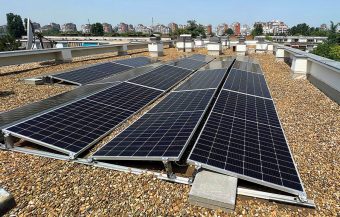The energy transition, which involves shifting from fossil fuels to clean and renewable energy sources, entails the democratization and decentralization of electricity production and consumption. Residential buildings, especially in larger cities where they comprise most of the housing facilities, play a crucial role in this transition by recognizing and utilizing the benefits of the new legal concept known as the prosumer model.
In addition to the obvious financial savings on electricity bills—since buildings can now produce their own electricity by installing solar panels on their rooftops—this model also allows residential communities to contribute to producing energy from renewable sources and reducing greenhouse gas emissions. Although legislative changes from 2022 enable both individual households and residential communities in Serbia to become prosumers by installing solar panels on their roofs, the number of residential communities that have taken advantage of this opportunity is extremely small. While thousands of individual households are currently registered as prosumers, there are only three residential communities.
IN FOCUS:
- Challenges of Competitive Energy Production in the Global Market
- INECP – Serbia on the Path to Sustainability
- We Are Actively Reducing CO2 Emissions in Our Operations
The Journey of a Thousand Miles Begins with the First Building!
German Development Cooperation provided financial and organizational support to one interested residential community in Novi Beograd, which decided to become a prosumer. This initiative, which includes the installation of a 15kW solar power plant on the roof of a building on Nehru Street, aims to serve as an example and a source of information for other residential communities considering a similar venture. In this pioneering project, seven apartment owners in a four-story building decided to jointly invest in the solar power plant, each contributing equally to 2kW shares.
The remaining 1kW of the plant’s capacity will be used for communal consumption within the building, further reducing maintenance costs. This residential community, selected via a public competition, received professional support and financial participation in purchasing and installing the solar power plant, which is now on the verge of being connected to the distribution grid. This is the first such power plant owned by multiple residents within a single residential community. All of them will benefit from the savings reflected in their electricity bills. Based on the experiences gained in cooperation with this residential community, German Development Cooperation, in partnership with the Ministry of Mining and Energy, has prepared a guide for residential communities that wish to become prosumers. The guide is expected to be published in the fall. It will provide comprehensive information and guidelines for residential communities that want to embark on the energy transition path and the self-production of electricity.

Measure Twice, Cut Once!
To further facilitate the decision-making process, German Development Cooperation has also adapted its solar calculator (www.solarnikalkulator.rs) to the specific needs of residential communities. This tool allows both individual households and residential communities to easily estimate the optimal capacity and size of a solar power plant in relation to the needs of the apartments and the available roof space. In addition to promoting the prosumer model, German Development Cooperation is actively engaged in raising awareness about energy efficiency.
In the upcoming period, special attention will be given to demonstrating the technical and financial viability of investing in combined measures—on the one hand, in energy efficiency (e.g., thermal insulation, window, and door replacement, etc.), and on the other, in renewable energy sources such as photovoltaic panels, solar collectors, and heating and cooling systems like various types of heat pumps.
GIZ
Read the whole story in the new issue of the Energy portal Magazine ENERGY TRANSITION

